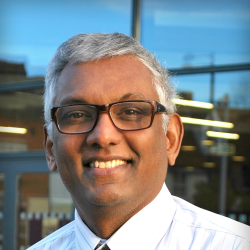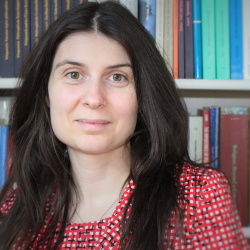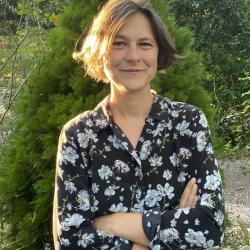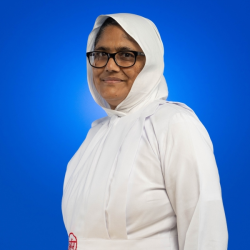
Eating and Fasting. A Contemporary Perspective
Mar 04, 2024
10:00 - 11:30 AM PST
Presiding: Atul Shah, Professor, City University of London, Emcee

Professor Atul K. Shah has a PhD from the London School of Economics and is author of ‘Inclusive and Sustainable Finance’ (Routledge 2022), 'Jainism and Ethical Finance' (with Aidan Rankin, Routledge 2017); The Politics of Financial Risk, Audit and Regulation (Routledge 2018) Reinventing Accounting and Finance Education (Routledge 2018), 'Celebrating Diversity' (2007) and 'Boardroom Diversity - The Opportunity' (2010). He is passionate about Business Ethics, Education Reform and Diversity. Dr. Shah has published a number of papers in international academic journals such as Accounting, Organisations and Society; Accounting, Auditing and Accountability Journal; European Accounting Review; Journal of Financial Regulation and Compliance; Business Ethics - A European Review. Between 1995 and 1998, he published a series of papers predicting the global financial crisis, focusing in particular on derivatives and systemic risk, and regulatory arbitrage. His work has been profiled in BBC and Forbes and Dr. Shah is presently working on a series of projects around financial risk management, diverse ethics and regulation. He has Broadcast experience, with credits including BBC Radio 4, BBC World Service, Channel 4, Five Live, BBC Radio 2, Guardian and BBC Asian Network. Professor Shah also writes and comments for the Financial Times. In 2010 Professor Shah embarked on a historic 1500 mile Masala Tour of Britain, to showcase the depth and breadth of the diversity in Britain and help the country improve its cultural intelligence – this was featured in the Guardian. The tour was also widely covered on BBC radio nationally. He is also a top Business Ethics writer for The Conversation and his research on global accounting won the Best Paper award in 2019.
Eating and Fasting. A Contemporary perspective
Presenter: Melanie Barbato, Lecturer, RWTH Aachen University

Melanie Barbato is the author of Jain Approaches to Plurality: Identity as Dialogue (Brill) and the editor of Interreligious Dialogue and Diplomacy, a special issue of Cross Currents (UNC Press). She is a lecturer at RWTH Aachen University, Germany, and coordinates the Network of Hinduism in Dialogue at the Oxford Centre for Hindu Studies, UK.
Food Security – An Issue for Practical Jain Studies
Food security refers to a situation in which every person is able to receive at all times a sufficient amount of safe and nutritious food. The disruptions caused by Covid19, the Russian attack on Ukraine, climate change and limited resources all show the vulnerability of global food systems and the need to rethink what the human diet should look like in the future. This presentation will discuss food security in the context of applied Jain Studies. Jains are at the forefront of religious groups that seek to motivate people towards dietary transition away from meat consumption towards a more sustainable vegetarian or vegan diet. Like other religious communities, Jains have a long history of maintaining or re-establishing food security. A recent example is the large-scale distribution of meals by Jain volunteers during the Covid19 pandemic. “What should we eat?” is a central question both for experts in food security and for Jains who want to live in today’s world according to the principles of their tradition. The presentation aims to show how these interests intersect, for example in the concept of food sovereignty, which takes seriously the cultural role that food plays for communities. The presentation will conclude with a discussion of the reasons why religious organisations should be represented also in policy discussions on fighting hunger and promoting a sustainable diet.
Presenter: Claire Maes, Professor, University of Tübingen, Germany

Claire Maes is Assistant Professor at the Department of Indology at the Institute of Asian and Oriental Studies of the University of Tübingen, Germany. She specializes in both historical and contemporary Jainism, as well as early Indian Buddhism. Her current research project focusses on the role of fasting in the Jain tradition, with a special focus on the Jain practice of fasting to death or sallekhanā.
Sallekhana and Asceticism in Jain Texts
In one group of Jain texts, sallekhanā (the fast to death) forms the apex of ascetic practice. It concludes the exemplary life of a Jain who, seeking to embody dharma to perfection, applies himself to long and tedious forms of asceticism. Compared to the Buddhist tradition of ancient India, Jains are often characterized as being more extreme. No matter the ascetic practice, Jains always seem to have gone one step further. Where Buddhists would eat meat, Jains adopted a vegetarian diet. Where Buddhist monks shaved their head, Jain ascetics plucked out their hair. Where Buddhist monastics ultimately rejected the ascetic practice of nakedness, some Jain groups made it their quintessential practice. These distinctions between early Buddhist monks and Jain ascetics are well documented. By contrast, the scholarly literature on Indian asceticism lacks critical examinations of the particular type of ascetic practices leading to sallekhanā. To start filling this gap, I will analyze in this lecture the story of Skandaka, as recounted in the Viyāhapannatti (Bhagavaī). I will focus on the series of increasingly
challenging ascetic practices that Skandaka completed before adopting the vow of sallekhanā. By doing so, I will argue for the interconnectedness between the refinement of moral virtues, the purification of the soul, and the disciplining of the body that, in the process, changes radically.
challenging ascetic practices that Skandaka completed before adopting the vow of sallekhanā. By doing so, I will argue for the interconnectedness between the refinement of moral virtues, the purification of the soul, and the disciplining of the body that, in the process, changes radically.





